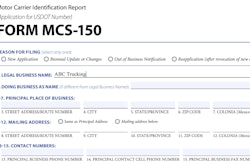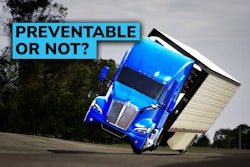Pete Buttigieg, the U.S. Transportation Secretary, along with FMCSA on Wednesday called out "junk fees" charged by predatory towing companies and parking lot pirates that "use their possession of the vehicle as leverage to prey upon truckers who are in no position to push back."
DOT and FMCSA together called for the end of fees for goods or services which have "no value" and which cost "nothing extra to provide," as well as a final rule to treat "each illegal junk fee as a separate violation" against the tow company.
[Related: Trucking's best defense against predatory towing: A step-by-step guide]
The last few years have seen a well-chronicled a rise in predatory towing horror stories, ranging from thousands of dollars for a simple boot removal all the way up to $140,000 for a single tractor-trailer accident. Further investigation has revealed that towing and recovery professionals now get training on how to inflate invoices, often billing egregiously for overhead items like headsets.
Buttigieg and FMCSA "expressed strong support for trucker protections against predatory towing fees in a comment filed on the Federal Trade Commission’s (FTC) proposed rule banning junk fees."
The move follows a larger push against "junk fees," which the FTC hopes to prohibit with a proposed rule that would stop "businesses from charging hidden and bogus junk fees by requiring them to include all mandatory fees when quoting a price."

"FMCSA believes that predatory towing fee practices fall within the purview of FTC’s proposed rule, which would greatly benefit truckers if finalized," FMCSA wrote in a statement.
“When a truck driver’s vehicle is towed, they can’t earn a living until they get it back — leaving them vulnerable to predatory junk fees from towing companies,” said Buttigieg. “We support FTC’s efforts to stand up for truckers by acting to ban junk fees and prevent predatory towing fees that can cause significant financial harm.”
FMCSA Acting Deputy Administrator Sue Lawless stressed the wider impact, too. “Predatory towing negatively impacts consumers, including commercial motor vehicle drivers and trucking companies. It is detrimental to the overall health of the trucking industry, and it's time to end excessive rates, surcharges and other unfair fees associated with predatory towing.”
As previously reported, attorneys involved in tow disputes have flagged the problem as existential for truck owners. Legal prospects, furthermore, for a carrier tied up in a predatory towing situation look dim.
Individual states have picked up the fight against predatory towing, with Maryland passing sturdy laws against the practice with regard to police-ordered, so-called nonconsensual or non-consent towing.
[Related: Trucking fights back against predatory towing: State laws that level the playing field]
A new bill in Florida's state legislature would require counties to set maximum towing rates (as Maryland has required) and storage fees, as well as force tow company to accept a wider range of document types and payments, alongside a raft of other regulations.
A new bill in Missouri's state legislature would require, among other things, itemized receipts for towing, something legal experts strongly encourage. The bill also would increase the documentation requirements around storing towed vehicles, and create a new pathway for owners of cargo to get their goods released.
The Owner-Operator's Independent Drivers Association supported both bills and have lobbied federally for such protections.
"There are a number of states interested in making changes regarding nonconsensual and predatory towing including Missouri, Maryland and Tennessee and others," wrote an OOIDA spokesperson.
But the federal push, part of a larger Biden Administration push to end "junk fees" like overdrafts on bank accounts, doesn't just apply to roadside nonconsensual tows, but parking lot pirates, too.
Here's how DOT and FMCSA summarized the problem, referencing their recent comment on the FTC's rule proposal:
Towing can occur at the request of the trucker after a breakdown, or at the request of law enforcement or a property owner if the vehicle has been parked illegally. In either case, towing causes substantial distress for truckers who are unable to earn a livelihood until they can regain access to their vehicle. Once their vehicle has been towed, truckers are in a very vulnerable position and highly susceptible to predation. FMCSA is concerned that predatory towing companies can and do use their possession of the vehicle as leverage to prey upon truckers who are in no position to push back.
While there are a wide range of predatory tactics associated with towing, a number of them center on the mandatory or otherwise unavoidable fees that towing companies charge. FMCSA’s comment outlines several potentially unfair or deceptive fee practices used by predatory towers. These include hiding fees until the tow is completed, charging for unnecessary or worthless services, and imposing an excessive number of fees for excessive amounts.
Here's specifically what FMCSA called for:
Ban junk fees for unnecessary goods or services: FMCSA suggests adding a provision that prohibits companies from charging any fee for an ancillary good or service that has no value, costs nothing extra to provide, or that reasonably would be assumed to be included in the upfront price of the good or service. For example, towing companies often charge “equipment fees” for using equipment that they already own and use routinely to provide the towing service.
Prohibit or restrict excessive junk fee practices: FMCSA encourages the FTC to consider prohibiting or imposing restrictions on excessive fee practices. These practices include charging an excessive number of fees, charging excessive amounts for a fee, or charging variable fees for fixed costs. The provision on excessive fees could focus on consumers who have little to no ability to avoid, negotiate, decline, anticipate, or limit the number or cost of the fees, or consumers who are vulnerable, in distress, or otherwise limited in choice by their circumstances.
Treat each illegal junk fee as a violation: FMCSA suggests that the final rule treat each illegal junk fee as a separate violation and that the rule expressly prohibit companies from charging or collecting mandatory fees that are not appropriately disclosed, are not included in the total price, and/or cannot be fully calculated upfront.
The FTC junk-fees proposal remains a long way from being finalized. Meantime, there's plenty owner-operators can do to insulate themselves from and/or contest egregious billing and other towing practices.










